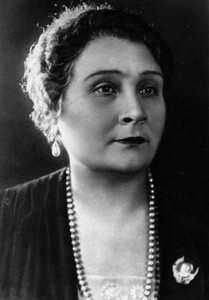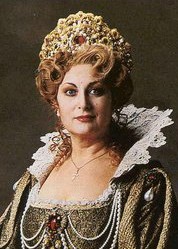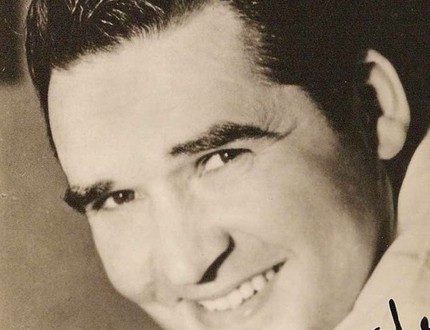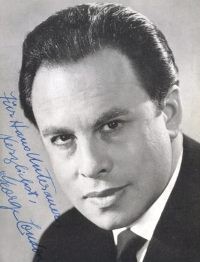
Nadezhda Andreevna Obukhova |
Nadezhda Obukhova

Laureate of the Stalin Prize (1943), People’s Artist of the USSR (1937).
For many years, the singer E.K. performed with Obukhova. Katulskaya. Here is what she says: “Each performance with the participation of Nadezhda Andreevna seemed solemn and festive and caused general delight. Possessing an enchanting voice, unique in its beauty of timbre, subtle artistic expressiveness, perfect vocal technique and artistry, Nadezhda Andreevna created a whole gallery of stage images of deep life truth and harmonious completeness.
Possessing an amazing ability of artistic transformation, Nadezhda Andreevna was able to find the necessary coloring of intonation, subtle nuances for a convincing depiction of the character of a stage image, for expressing various human feelings. The naturalness of performance has always been combined with the beauty of sound and the expressiveness of the word.
Nadezhda Andreevna Obukhova was born on March 6, 1886 in Moscow, into an old noble family. Her mother died early from consumption. The father, Andrei Trofimovich, a prominent military man, busy with official affairs, entrusted the upbringing of children to his maternal grandfather. Adrian Semenovich Mazaraki raised his grandchildren – Nadia, her sister Anna and brother Yuri – in his village, in the Tambov province.
“Grandfather was an excellent pianist, and I listened to Chopin and Beethoven in his performance for hours,” Nadezhda Andreevna later said. It was the grandfather who introduced the girl to playing the piano and singing. Classes were successful: at the age of 12, little Nadya played Chopin’s nocturnes and Haydn’s and Mozart’s symphonies in four hands with her grandfather, patient, strict and demanding.
After the loss of his wife and daughter, Adrian Semenovich was very afraid that his granddaughters would not get sick with tuberculosis, and therefore in 1899 he brought his granddaughters to Nice.
“In addition to our studies with Professor Ozerov,” the singer recalls, “we began to take courses in French literature and history. These were Madame Vivodi’s private courses. We went through the history of the French Revolution in particular detail. This subject was taught to us by Vivodi herself, a most intelligent woman who belonged to the advanced, progressive intelligentsia of France. Grandpa continued to play music with us.
We came to Nice for seven winters (from 1899 to 1906) and only in the third year, in 1901, did we start taking singing lessons from Eleanor Linman.
I have loved to sing since childhood. And my cherished dream has always been to learn to sing. I shared my thoughts with my grandfather, he reacted very positively to this and said that he himself had already thought about it. He began to make inquiries about professors of singing, and was told that Madame Lipman, a student of the famous Pauline Viardot, was considered the best teacher in Nice. My grandfather and I went to her, she lived on the Boulevard Garnier, in her small villa. Madame Lipman greeted us cordially, and when grandfather told her about the purpose of our arrival, she became very interested and delighted to learn that we were Russians.
After an audition, she found that we had good voices and agreed to work with us. But she did not immediately identify my mezzo-soprano and said that in the process of work it would be clear in which direction my voice would develop – down or up.
I was very upset when Madame Lipman found that I had a soprano, and envied my sister because Madame Lipman recognized her as a mezzo-soprano. I have always been sure that I have a mezzo-soprano, a low sound was more organic for me.
Madame Lipman’s lessons were interesting, and I went to them with pleasure. Madame Lipman herself accompanied us and showed us how to sing. At the end of the lesson, she demonstrated her art, sang a wide variety of arias from operas; for example, the contralto part of Fidesz from Meyerbeer’s opera The Prophet, the aria for dramatic soprano Rachel from Halevy’s opera Zhidovka, the coloratura aria of Marguerite with Pearls from Gounod’s opera Faust. We listened with interest, marveled at her skill, technique and the range of her voice, although the voice itself had an unpleasant, harsh timbre and she opened her mouth very wide and ugly. She accompanied herself. At that time I still had little understanding of art, but her skill amazed me. However, my lessons were not always systematic, as I often had a sore throat and could not sing.
After the death of their grandfather, Nadezhda Andreevna and Anna Andreevna returned to their homeland. Nadezhda’s uncle, Sergei Trofimovich Obukhov, served as theater manager. He drew attention to the rare qualities of Nadezhda Andreevna’s voice and her passion for the theater. He contributed to the fact that at the beginning of 1907 Nadezhda was admitted to the Moscow Conservatory.
“The class of the illustrious professor Umberto Mazetti at the Moscow Conservatory became, as it were, her second home,” writes G.A. Polyanovsky. – Diligently, forgetting about sleep and rest, Nadezhda Andreevna studied, catching up, as it seemed to her, lost. But health continued to be weak, climate change was abrupt. The body required more careful care – the illnesses suffered in childhood affected, and heredity made itself felt. In 1908, just a year after the start of such successful studies, I had to interrupt my studies at the conservatory for a while and go back to Italy for treatment. She spent 1909 in Sorrento, in Naples, on Capri.
… As soon as Nadezhda Andreevna’s health got stronger, she began to prepare for the return trip.
Since 1910 – again Moscow, conservatory, class of Umberto Mazetti. She is still very seriously engaged, comprehending and selecting everything valuable in the Mazetti system. A wonderful teacher was a smart, sensitive mentor who helped the student learn to hear himself, consolidate the natural flow of sound in his voice.
Still continuing to study at the conservatory, Obukhova went in 1912 to try out in St. Petersburg, at the Mariinsky Theater. Here she sang under the pseudonym Andreeva. The next morning, the young singer read in the newspaper that only three singers stood out in the audition at the Mariinsky Theatre: Okuneva, a dramatic soprano, someone else I don’t remember, and Andreeva, a mezzo-soprano from Moscow.
Returning to Moscow, on April 23, 1912, Obukhova passed the exam in the singing class.
Obukhova recalls:
“I did very well in this exam and was appointed to sing at the annual assembly concert in the Great Hall of the Conservatory on May 6, 1912. I sang the aria of Chimene. The hall was full, I was received very warmly and called many times. At the end of the concert, many people came up to me, congratulated me on my success and on graduating from the conservatory, and wished me great victories on my future artistic path.
The next day I read a review by Yu.S. Sakhnovsky, where it was said: “Mrs. Obukhova (Professor Mazetti’s class) left a wonderful impression with the performance of Chimene’s aria from “Cid” by Massenet. In her singing, in addition to her excellent voice and excellent ability to master it, one could hear sincerity and warmth as an undoubted sign of a great stage talent.
Shortly after graduating from the conservatory, Obukhova married Pavel Sergeevich Arkhipov, an employee of the Bolshoi Theater: he was in charge of the production and editing department.
Until 1916, when the singer entered the Bolshoi Theater, she gave many concerts throughout the country. In February, Obukhova made her debut as Polina in The Queen of Spades at the Bolshoi Theatre.
“First show! What memory in the soul of an artist can compare with the memory of this day? Full of bright hopes, I stepped onto the stage of the Bolshoi Theater, as one enters one’s own home. This theater was and remained such a home for me throughout my more than thirty years of work in it. Most of my life has passed here, all my creative joys and good luck are connected with this theater. Suffice it to say that in all the years of my artistic activity, I have never performed on the stage of any other theater.
April 12, 1916 Nadezhda Andreevna was introduced to the play “Sadko”. Already from the first performances, the singer managed to convey the warmth and humanity of the image – after all, these are the distinctive features of her talent.
N.N. Ozerov, who performed with Obukhova in the play, recalls: “N.A. Obukhova, who sang on the day of the first performance that was significant for me, created an amazingly complete and beautiful image of a faithful, loving Russian woman, the “Novgorod Penelope” – Lyubava. The velvety voice, remarkable for the beauty of the timbre, the freedom with which the singer disposed of it, the captivating power of feelings in singing always characterized the performances of N.A. Obukhova”.
So she began – in collaboration with many outstanding singers, conductors, directors of the Russian stage. And then Obukhova herself became one of these luminaries. She sang more than twenty-five parties on the stage of the Bolshoi Theater, and each of them is a pearl of the Russian vocal and stage art.
E.K. Katulskaya writes:
“First of all, I remember Obukhova – Lyubasha (“The Tsar’s Bride”) – passionate, impulsive and decisive. By all means she fights for her happiness, for loyalty to friendship, for her love, without which she cannot live. With touching warmth and deep feeling, Nadezhda Andreevna sang the song “Equip it quickly, dear mother …”; this wonderful song sounded in a wide wave, captivating the listener …
Created by Nadezhda Andreevna in the opera “Khovanshchina”, the image of Martha, an unbending will and a passionate soul, belongs to the creative heights of the singer. With persistent artistic consistency, she vividly reveals the religious fanaticism inherent in her heroine, which gives way to fiery passion and love to the point of self-sacrifice for Prince Andrei. The wonderful lyrical Russian song “The Baby Came Out”, like Martha’s fortune-telling, is one of the masterpieces of vocal performance.
In the opera Koschei the Immortal, Nadezhda Andreevna created an amazing image of Koshcheevna. The true personification of “evil beauty” was felt in this image. Terrible and merciless cruelty sounded in the singer’s voice, along with a deep feeling of passionate love for Ivan Korolevich and painful jealousy for the princess.
N.A. created bright timbre colors and expressive intonations. Obukhov’s radiant, poetic image of Spring in the fairy-tale opera “The Snow Maiden”. Majestic and spiritual, radiating sunshine, warmth and love with her charming voice and sincere intonations, Vesna-Obukhova conquered the audience with her wonderful cantilena, which this part is so full of.
Her proud Marina, the merciless rival of Aida Amneris, the freedom-loving Carmen, the poetic Ganna and Polina, the power-hungry, courageous and treacherous Delilah – all these parties are diverse in style and character, in which Nadezhda Andreevna was able to convey the subtlest shades of feelings, merging musical and dramatic images. Even in the small part of Lyubava (Sadko), Nadezhda Andreevna creates an unforgettable poetic image of a Russian woman – a loving and faithful wife.
All her performance was warmed by a deep human feeling and vivid emotionality. Singing breath as a means of artistic expression flowed in an even, smooth and calm stream, finding the form that the singer must create to decorate the sound. The voice sounded in all registers evenly, richly, brightly. Magnificent piano, forte without any tension, “velvet” notes of her unique, “Obukhov’s” timbre, expressiveness of the word – everything is aimed at revealing the idea of the work, musical and psychological characteristics.
Nadezhda Andreevna won the same fame as on the opera stage as a chamber singer. Performing a variety of musical works – from folk songs and old romances (she performed them with inimitable skill) to complex classical arias and romances by Russian and Western composers – Nadezhda Andreevna showed, as in opera performance, a subtle sense of style and an exceptional ability of artistic transformation. Performing in numerous concert halls, she captivated the audience with the charm of her artistry, creating spiritual communication with them. Whoever heard Nadezhda Andreevna in an opera performance or concert remained an ardent admirer of her radiant art for the rest of his life. Such is the power of talent.”
Indeed, having left the opera stage in the prime of her life in 1943, Obukhova devoted herself to concert activity with the same exceptional success. She was especially active in the 40s and 50s.
The age of the vocalist is usually short. However, Nadezhda Andreevna, even at the age of seventy-five, performing in chamber concerts, amazed the audience with the purity and soulfulness of the unique timbre of her mezzo-soprano.
On June 3, 1961, a solo concert of Nadezhda Andreevna took place at the Actor’s House, and on June 26, she sang a whole section in the concert there. This concert turned out to be the swan song of Nadezhda Andreevna. Having gone to rest in Feodosia, she suddenly died there on August 14.





